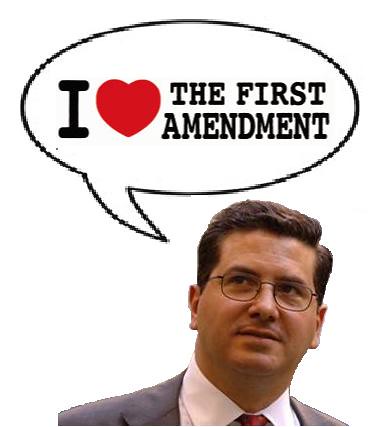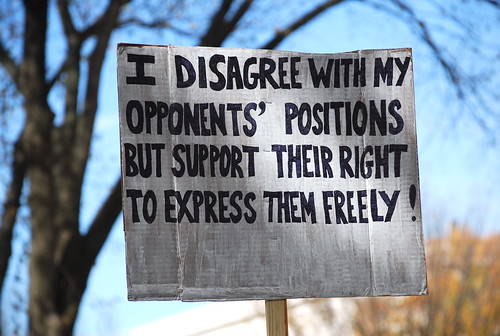
‘Leisure in the Grass’
courtesy of ‘Kevin H.’
The Wolf Trap Foundation presented its employees with a new social media policy this year. Unless you happen to work for them this probably strikes you as about as interesting, news-wise, as the Pope continuing to be Catholic. Social media policies aren’t anything new or even necessarily anything to be concerned about. There’s something to be said for knowing where you stand and what standard you’ll be expected to meet.
When we spoke last year about this issue it was something brought on by Meg’s termination. We Love DC’s media law go-to Kevin Goldberg helped us understand the ins and outs of defamation suits and we more or less closed out by pointing you to his article on his firm’s blog about writing a social media policy for your organization. When I shared the details with him he said they probably represented “a step up from what is required” when it comes to the nature of the guidance.
What makes Wolf Trap somewhat interesting is that the people bound by this policy work side by side with people who are not bound by it. Foundation employees are working for a general non-profit but another sizable group at the park are federal employees of the National Park Service – folks who have sometimes better, sometimes just different free speech protections than the average employee. Like what? What’s Wolf Trap’s guidance? For that you’ve gotta read on…
Wolf Trap declined to share their exact policy with us but it was leaked to us and we’ve put it up on DocumentCloud.
It’s a fairly simple document and sets expectations, though it’s a little overly broad for my taste. Compare some pieces to the guidance that healthcare giant Roche provides to their employees[pdf] for when they’re speaking as themselves, not representatives of the company.
You are responsible for your actions. You are “speaking” publicly and your contribution may stay searchable and retrievable for a long time to a broad audience – both internally and externally. Anything that brings damage to our business or reputation will ultimately be your responsibility. This does not mean that you should refrain from any activity, but that you should use common sense and take at least the same caution with social media as with all other forms of communication.
There’s no such division of work and home life for Wolf Trap’s employees – they’re always on notice.
Whether or not you identify yourself as a Wolf Trap Foundation employee, seasonal staff member or intern, Wolf Trap Foundation must not be falsely represented, or represented in a way that will injure its reputation or business.
I don’t love the idea that someone who never identifies themselves with Wolf Trap online can’t state an honest and verifiable fact if it makes Wolf Trap look bad. Saying that the lawn seems soggy might negatively impact ticket sales for the night, is that beyond the pale? The incident that was related to us by our leaker was that someone had made an online comment about the presence of bomb-sniffing dogs at a show entrance and got prodded by HR about it. If that harms Wolf Trap’s image it’s not the employee’s fault, is it?

‘Dan Snyder, Free Speech Crusader’
courtesy of ‘Mike Licht, NotionsCapital.com’
The long and short of it, though, is that it really doesn’t matter. Most folks in the US are at-will employees and are not protected by a labor contract, so they can be canned for pretty much anything that isn’t one of a narrow group of protected reasons/classes. If the Wolf Trap Foundation wanted to make promoting every show on your own personal Facebook page a condition of your continued employment they could do it. Their reasonable-sounding document above doesn’t prevent the Roche corporation from going ahead and firing someone who tweeted something negative about the new cafeteria paint color.
The weirdness for Wolf Trap is the fact that these at-will Foundation employees are working side by side with National Park Service employees who are employed by the Federal government. Foundation employees handle most of the show-related business while the NPS folks handle the maintenance and some of the theater technical work.The Park Service employees may still be at-will but the courts over the years have shown some additional protection for them when it comes to being fired for their speech. After all, the first amendment talks about how government can’t limit speech, not corporations. So when the government is the employer they’ve been held somewhere in the middle.

‘I disagree with my opponents’ positions but support their right to express them freely!’
courtesy of ‘afagen’
If you’ve got a minor case of law nerd *cough* you might find this congressional research office writeup about the court history interesting[pdf]. Federal employees are covered around page 30 or so and it talks about the fine line the courts have walked between saying you can’t fire someone for speech about legitimate public interest, but office gossip is another matter. And the porn, well, let’s just say you shouldn’t do it in your police uniform.
And you thought the law was boring.
The reality is that folks working for the Wolf Trap Foundation have the same worry as any other private employee, regardless of whether they have a great policy, a crappy one, or none at all: it all comes down to whether or not the folks in charge choose to handle managing folks with subtly and trust or blanket approaches and nitpicking. Those of you who are in the employ of the federal government have the same problem; protections against being sanctioned for your speech doesn’t protect you from being badly managed or fired under a false pretense.
So be careful what you say online. Three can keep a secret… if two are dead and none of them are on Facebook.

Lawyers ruin everything. What does Wolf Trap have to worry about? You’d think they’d want their employees sharing news about the good things that they’re doing and engaging their personal networks. Instead, if I worked there, I’d never want to mention Wolf Trap at all.